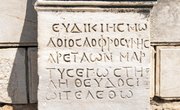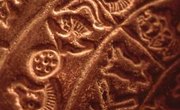For some time after the Norman Conquest of 1066, the English ruling class spoke a different language than the Anglo-Saxons they had conquered. Linguistic historians use manuscript evidence, particularly from legal documents, chronicles and creative works, to describe the aristocracy’s gradual shift from speaking Norman to speaking Middle English.
Before the Conquest
The designation "the Normans" refers to the inhabitants of Normandy, a region in the northwest of present-day France just across the English Channel from Britain. The Normans, whose name derives from the English words "Norsemen" and "Northmen," were descended from Vikings who had migrated to the region from the north. But by the 11th century, they spoke a dialect of Old French called Norman French. At that point, Old French, also called the Langue d’Oil, did not have a standard form, but rather described a range of dialects that included Norman French. William the Conqueror, Duke of Normandy, and his people thus spoke Norman French, also just called "Norman," when they invaded England in 1066.
New to England
Linguistic historians use the term Anglo-Norman to describe the language spoken by Normans living in England after 1066. The date of the invasion marks the moment when their form of Old French became isolated from the Norman dialect and started changing independently. Anglo-Norman was increasingly characterized by borrowed vocabulary and syntactical features of Anglo-Saxon origin. “Anglo-Norman Literature: A Guide to Texts and Manuscripts” lists almost 1,000 literary texts in Anglo-Norman, many of which were likely read aloud or performed for a listening audience. Scholars often mark the end of the Anglo-Norman period with the French takeover of Normandy, completed by King Philip of France in 1204. At this point, the Anglo-Norman nobility lost their lands in Normandy and thus had no pressing need to communicate in French with their agents abroad.
Getting Assimilated
Middle English thus became the primary vernacular, or first language, for people of Norman descent in England by the early 13th century, although broad linguistic change from Anglo-Norman to Middle English naturally occurred on a spectrum rather than at a fixed date. Jacquie Heys points out in "French as a Mother-Tongue in Medieval England," an article posted online by the University of Toronto, that people of Norman descent who lived closer to Normandy spoke Anglo-Norman for a longer time than did those who lived inland from the English coast, but that certainly by the 14th century, their Anglo-Norman was highly influenced by Middle English. During this century, Middle English gained legitimacy as a literary language, thanks in part to writers such as Geoffrey Chaucer, William Langland and John Gower, and it became the official spoken language of Parliament in 1362.
The Literate Language
Although the first language of the Normans and their descendants shifted from Norman to Anglo-Norman to Middle English, many of them also spoke Latin with various levels of fluency. Being called “literate” in the Middle Ages meant you could read and speak Latin, the language of the church, scholarship and international politics. The Normans and their descendants wrote such diverse genres as legal documents, letters, religious texts, histories, scholarly treatises and poetry in Latin, and Latin was spoken in churches and frequently used for legal proclamations.
Related Articles
References
- Fordham University: The French of England
- Anglo-Norman Literature: A Guide to Texts and Manuscripts; ed. Ruth Dean et al.; 1999
- University of Toronto: French as a Mother-Tongue in Medieval England
- The Norman Conquest and the Subjection of English, 1066-1200; Albert C. Baugh and Thomas Cable; 1978
- Regia Anglorum: Who Were the Normans?
- Speculum: The Use of English: Language, Law, and Political Culture in Fourteenth-Century England
- Fordham University: Medieval Sourcebook: Three Sources on the Ravages of the Northmen in Frankland, c. 843-912
Writer Bio
Elissa Hansen has more than nine years of editorial experience, and she specializes in academic editing across disciplines. She teaches university English and professional writing courses, holding a Bachelor of Arts in English and a certificate in technical communication from Cal Poly, a Master of Arts in English from the University of Wyoming, and a doctorate in English from the University of Minnesota.










